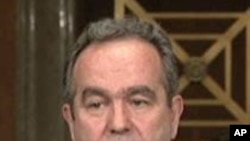At a Senate subcommittee hearing on Wednesday, U.S. Assistant Secretary of State for East Asia and Pacific Affairs, Kurt Campbell, outlined the Obama administration's new approach of pragmatic engagement with Burma's military government. Campbell held preliminary talks this week with Burmese officials in New York and was questioned about what the new policy aims to achieve and the impact it might have on bringing about democratic reform in Burma.
Burma's powerful military has pushed ahead since 1990 with a process that would lock in a new military-dominated constitution.
And the country's opposition leader, Aung San Suu Kyi, remains under house arrest.
Assistant Secretary of State Kurt Campbell told the Senate subcommittee the Obama administration hopes that engagement will bring results, unlike sanctions. "The sanctions effort, while providing an inconvenience in many respects to the regime, and there are areas that they can be very effective, in the overall context has been unsuccessful in accomplishing the goals that really all of us have vis a vis Burma," he states.
Democratic Senator James Webb visited Burma in August and met with senior Burmese military leader Than Shwe.
That visit paved the way for Webb's talks in New York with Prime Minister Thein Sein, in late September.
Webb supports the Obama administration approach. "I believe that the political motivations behind our isolation of Burma were honorable, based on a desire to see democratic governance and a respect for human rights inside that country," he says, "At the same time, the situation we face with Burma is an example of what can happen when we seek to isolate a country from the rest of world, but the rest of the world does not follow."
Webb says the U.S. and international community should watch for signs of progress as the U.S. initiative moves ahead.
Next year, Burma's military leaders plan national elections, the first since 1990.
Professor David Williams, of Indiana University, doubts a democratic result will come from the elections. He predicts an escalation of conflict between Burma's military and ethnic armed groups. "We know for a fact that the Burmese military is gearing up for offensives around the country, right now putting in supplies and resources, and that the resistance groups are gearing up for resistance. The mountains will run with blood as the elections approach," he said.
Assistant Secretary Campbell said the U.S. will continue to press for democratic reform in Burma and the release of Aung San Suu Kyi and other political prisoners.
He said there will be no change in U.S. sanctions without signs of progress on key issues. "Lifting or easing sanctions at the outset of a dialogue without meaningful progress on our concerns would be a mistake and would sent the wrong message," Campbell said.
Aung San Suu Kyi supports a US dialogue with Burma's military rulers, without preconditions, according to a spokesman for the National League for Democracy (Nyan Win) who spoke this week.
News
US Diplomat Outlines Obama Approach on Burma
update

<!-- IMAGE -->



